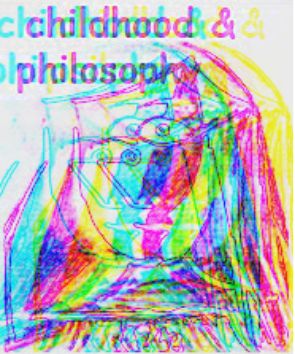the postmodern turn in childhood studies and its pedagogical implications
DOI:
https://doi.org/10.12957/childphilo.2024.82031Keywords:
childhood studies, postmodernism, the nature of childhood, binary opposition, subjectivityAbstract
This paper reflects on the postmodern shift in childhood studies and its impact on education. As scholars interrogate the modern notion of childhood, the discourse of postmodernism has entered the realm of childhood studies, yielding various new perspectives on childhood. The key characteristics of the postmodern shift in childhood studies include: 1) the rejection of essentialism regarding childhood and the recognition of the diversity inherent in it; 2) the deconstruction of binary oppositions and the advocacy for the heterogeneous nature of childhood and the concept of "becoming-child"; 3) the dissolution of the modern subject associated with childhood and the reconstruction of the postmodern subject. Postmodern childhood studies will bring some positive impacts to the field of education, such as focusing on the differences among children rather than abstracting them into a unified map, removing adultism from education, and emphasizing the construction of new forms of child subjectivity in education. However, at the same time, it will also bring many challenges to education, such as questioning the essence of childhood and good education, shaking the foundation of educational existence brought by the dissolution of childhood, and the loss of educational significance due to the fluid and changing construction of child subjectivity. This underscores the importance of acknowledging that as education embraces the discourse of postmodern childhood, both its promises and perils will permeate the educational domain.
Downloads
References
Alloway, N. (1997). Early childhood education encounters the postmodern: What do we know? What can we count as ‘true’? Australasian Journal of Early Childhood, 22(2), 1–5.
Aries, P. (1962). Centuries of Childhood: A Social History of Family Life (R. Baldick, Trans.). Alfred A. Knopf.
Best, S., & Kellner, D. (1991). Postmodern Theory: Critical Interrogations. Macmillan Education LTD.
Biesta, G. (2013). The beautiful risk of education. Routledge.
Dahlberg, G., Moss, P., & Pence, A. (1999). Beyond Quality in Early Childhood Education and Care: Postmodern Perspectives. Falmer Press.
Dallmayr, F. R. (1981). Twilight of Subjectivity: Contributions to a Post-individualist Theory of Politics. The University of Massachusetts Press.
Deleuze, G., & Guattari, F. (1987). A thousand plateaus: capitalism and schizophreni (B. Massumi, Trans.). University of Minnesota Press.
Derrida, J. (1981). Positions. trans A Bass. The University of Chicago Press.
Derrida, J. (1997). Of grammatology (G. C. Spivak, Trans.). The Johns Hopkins University Press.
Eagleton, T. (1996). The Illusions of Postmodernism. Blackwell Publishing Ltd.
Edwards, R., & Usher, R. (1994). Postmodernism and Education: Different Voices, Different Worlds. Routledge.
Feng, J. (2003). Lectures on Post-modernist philosophy. Commercial press.
Franks, J. (1994). Post-modern concept of subjectivity. Foreign social sciences, (1), 11–16.
Fry, K. (2014). Lyotard and the philosopher child. Childhood & Philosophy, 10(20), 233–246.
James, A., & Prout, A. (1997). Constructing and Reconstructing Childhood. Falmer Press.
James, A., Jenks, C., & Prout, A. (1998). Theorizing Childhood. Polity Press.
Kennedy, D. (1992). The Hermeneutics of Childhood. Philosophy Today, 36(1), 44–59.
Kennedy, D. (2006). Changing conceptions of the child from the renaissance to post-modernity: a philosophy of childhood. The Edwin Mellen Press.
Kennedy, D. (2013). Becoming Child, Becoming Other: Childhood as Signifier. In A. Muller (Ed.), Childhood in English Renaissance. Wissenschaftlicher Verlag Trier.
Kohan, W. O. (2011). Childhood, Education and Philosophy: Notes on Deterritorialisation. Journal of Philosophy of Education, 45(2), 339–357.
Lyotard, J.-F. (1984). The postmodern condition (G. Bennington & B. Massumi, Trans.). University of Minnesota Press.
Lyotard, J.-F. (1992). Manimise. Philosophy Today, 36(4), 419–427.
Lyotard, J.-F. (1992). That which resists, after all. Philosophy Today, 36(4), 402–417.
Mai, Y. X. (2013). Deleuze’s philosophical poetics. Guangxi Normal University Press.
Meynert, M. (2013). Conceptualizations of childhood, pedagogy and educational research in the postmodern: A critical interpretation [Licentiate thesis, Education]. Lund University.
Miao, M. (2016). The essence of Childhood: thinking based on two Childhood Research Paradigm. Journal of Anhui normal University, (3), 390–396.
Petropoulos, G. (2023). Challenging adult-centrism: speaking speech and the possibility of intergenerational dialogue. childhood & philosophy, 19, 1–22. https://doi.org/10.12957/childphilo.2023.73517
Postman, N. (1982). The disappearance of childhood. Delacorte Press.
Prout, A. (2005). The Future of Childhood. Routledge Falmer.
Turner, S. M., & Matthews, G. B. (1998). The Philosopher’s Child: Critical Perspectives in the Western Tradition. University of Rochester Press.
Wall, J. (2019). From childhood studies to childism: reconstructing the scholarly and social imaginations, Children’s Geographies, 20(3), 257–270. https://doi.org/10.1080/14733285.2019.1668912
Wang, M. A. (2000). The philosophical discourse of post-modernity. Zhejiang people’s Publishing House.




